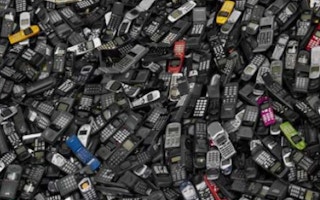KIEL – Would you throw gold, silver, or other precious metals into the trash? Probably not intentionally. But if you have thrown away an old mobile phone, not realizing that it contains a host of recyclable metals, you are not alone; the average American disposes of a mobile phone every two years, with only one out of ten dismantled and recycled.
While the value of the metals in each phone is low, the massive number of phones that end up in landfills or incinerators – roughly 135 million in the United States alone in 2010, according to the Environmental Protection Agency – amounts to hundreds of millions of dollars of wasted resources annually. Given that mining landfills for mobile phones is expensive and inefficient, consumers need a stronger incentive to recycle their old devices. A compulsory deposit on mobile phones could provide it.
Although collection agencies offer cash in exchange for old mobile phones, few people know that they exist. For those who do, the promise of a few dollars is inadequate to motivate them to expend the time and effort needed to find and go to a collection point. Indeed, the payment will probably not even cover the cost of the gas needed to get there.
By contrast, recouping a deposit of, say, $25 could prove to be a much more powerful incentive. Given that the deposit must be paid at the time of purchase, it would increase awareness of the device’s inherent value. More important, the higher dollar amount would make the effort of returning the phone worthwhile for a much larger proportion of the population, regardless of whether they identify with the goal of preserving resources. People would be less likely to keep old devices tucked away for no reason if their own money was on the line.
Such a scheme would likely be met with some resistance, with mobile-phone producers arguing that, by increasing the cost of their products, the deposit system could undermine demand, especially from poorer customers purchasing cheap phones. But their profits are on the line either way: if people continue to dump valuable resources, the price of mobile phones – not to mention the prices of other electronic devices – will rise just as surely.
That is because the problem of electronic waste extends beyond the squandering of the metals themselves. Mining and manufacturing metals is a costly, energy-intensive, and, often, ecologically destructive process. Smelting copper ore, for example, is more than twice as energy-intensive as recycling copper.
Furthermore, mobile-phone batteries contain toxic substances, including heavy metals like cobalt, lead, and zinc. If the device is incinerated or left to degrade in a landfill, these substances can leak into soil and groundwater, seriously harming human health and the environment. Just as a deposit system has enabled Germany to reduce substantially the uncontrolled disposal of toxic car batteries, such a scheme could help to keep toxic mobile-phone batteries out of the waste stream.
In fact, deposit systems have proved effective in promoting recycling of a wide variety of products. In many countries, consumers pay a small deposit on glass bottles and aluminum cans. The introduction of a deposit scheme for plastic bottles in Germany boosted the plastic-recycling rate significantly.
A mobile-phone deposit system could be the first step toward a wider scheme aimed at all consumer electronics, more than half of which are not properly recycled. Given that larger devices like computers and televisions contain even more precious metals, an effective system for encouraging proper end-of-life treatment is essential.
Of course, several practical questions will have to be resolved before introducing a mobile-phone deposit scheme. For example, what should be done about phones for which no deposit has been paid, whether because they were already in circulation when the scheme was launched or because they were purchased abroad? One solution would be to record the serial numbers of all mobile phones for which a deposit has been paid. The benefits of higher recycling rates would surely offset the associated administrative costs.
A mobile-phone deposit system would promote recycling, reduce mining, conserve resources, and limit toxic waste. So why aren’t policymakers speed-dialing each other to ensure that such a system is implemented?
Matthias Weitzel and Christine Merk are researchers at the Kiel Institute for the World Economy. This post originally appeared here.








